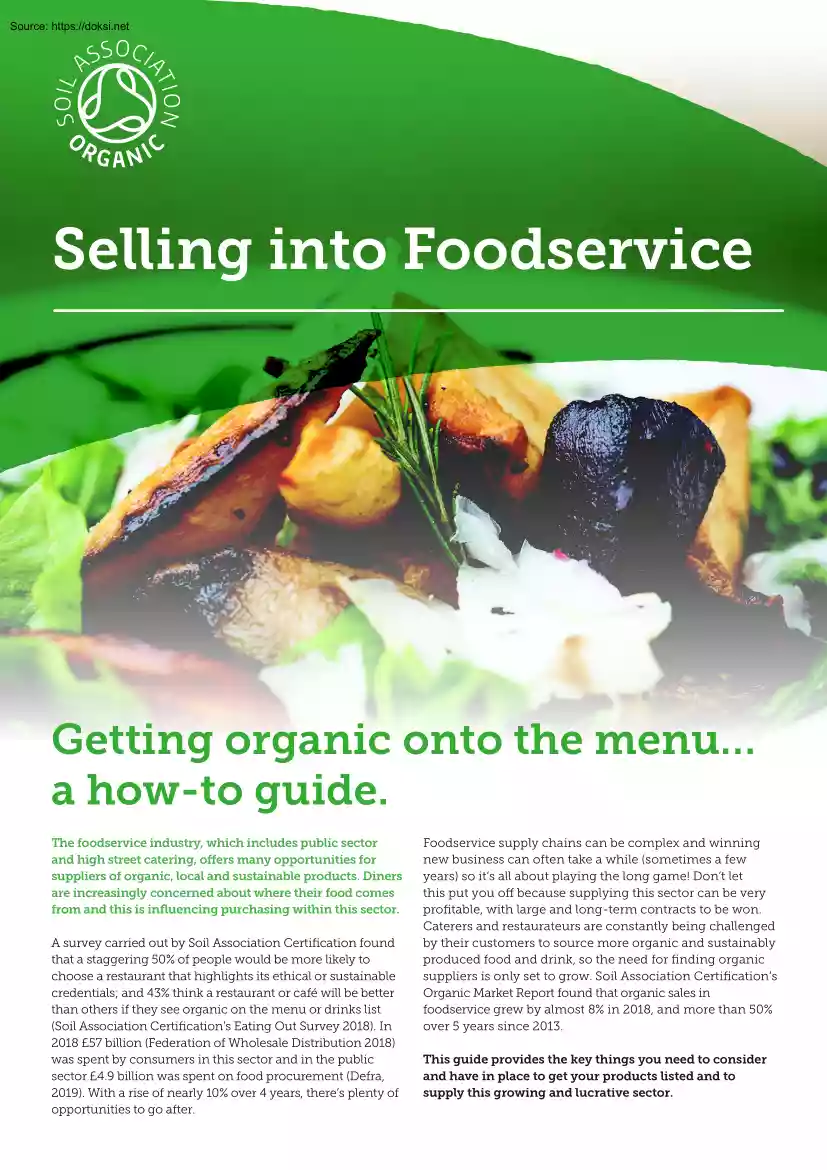Please log in to read this in our online viewer!

Please log in to read this in our online viewer!
No comments yet. You can be the first!
What did others read after this?
Content extract
Selling into Foodservice Getting organic onto the menu a how-to guide. The foodservice industry, which includes public sector and high street catering, offers many opportunities for suppliers of organic, local and sustainable products. Diners are increasingly concerned about where their food comes from and this is influencing purchasing within this sector. A survey carried out by Soil Association Certification found that a staggering 50% of people would be more likely to choose a restaurant that highlights its ethical or sustainable credentials; and 43% think a restaurant or café will be better than others if they see organic on the menu or drinks list (Soil Association Certification’s Eating Out Survey 2018). In 2018 £57 billion (Federation of Wholesale Distribution 2018) was spent by consumers in this sector and in the public sector £4.9 billion was spent on food procurement (Defra, 2019). With a rise of nearly 10% over 4 years, there’s plenty of opportunities to go after.
Foodservice supply chains can be complex and winning new business can often take a while (sometimes a few years) so it’s all about playing the long game! Don’t let this put you off because supplying this sector can be very profitable, with large and long-term contracts to be won. Caterers and restaurateurs are constantly being challenged by their customers to source more organic and sustainably produced food and drink, so the need for finding organic suppliers is only set to grow. Soil Association Certification’s Organic Market Report found that organic sales in foodservice grew by almost 8% in 2018, and more than 50% over 5 years since 2013. This guide provides the key things you need to consider and have in place to get your products listed and to supply this growing and lucrative sector. Case Studies: The Organic Pantry and Peelham Farm There are some great examples of businesses who are already benefitting from supplying this sector. The Organic Pantry, a family run farm,
started supplying public sector caterers in 2015 after receiving an inbound enquiry from a local authority school caterer. Eventually, they invested in machinery to pre-prepare their vegetables and add value to their products. Now, the company supplies several school caterers, including many local authority ones, and has developed good relationships with local wholesalers to help get their product to market. This now makes up 30% of their business. Freddie Watson of Organic Pantry says “We are currently supplying schools and nurseries throughout Leicestershire, Nottinghamshire, Derbyshire, Lancashire and Yorkshire with prepped organic potatoes that are easy for the kitchens to use and safe for children to consume. To get organics into the mass catering marketplace they need to match the convenience of their conventionally produced counterparts.” Peelham Farm is a small, family-owned business in Berwickshire that produces pork, beef and lamb and adds value via their in-house
butchery facility. Owner Denise Walton has been supplying hotels and restaurants for some time now and sees this as an excellent way to provide market diversity to her business and improve its long-term security. What are caterers and chefs looking for? How do foodservice supply chains work? Sustainable sourcing is high on the agenda for caterers and chefs, and consumer demand for local, sustainable and organic products is growing. Consumers we surveyed said they were 72% more likely to choose a restaurant that had sustainable sourcing credentials (Soil Association Certification’s Eating Out Survey 2018). Ian Platt, Head of Procurement at Westbury Street Holding Limited (WSH) told us “customers and clients are becoming more interested in sustainable sourcing and WSH have been introducing organic suppliers and fairtrade products to meet the growing demand across all sectors of the group.” Organic sales have been on the rise for eight years and the Soil Association’s Organic
Market Report found that in 2018 organic sales in foodservice grew by almost 8%, 2.4% more than overall organic market growth, making foodservice a key growth sector. The foodservice sector is made up of companies who provide meals outside of the home. This includes in-house public sector caterers and contract caterers (schools, hospitals, workplaces and care homes etc) and high street eateries (restaurants, café chains and independents.) It is a growing and ever evolving sector and with one in four meals eaten outside of the home, it offers fantastic supply opportunities. Procurement is undertaken differently in each of these settings. For high street chains, procurement is often done centrally and for independent restaurants and cafés they often purchase directly or via wholesalers. Public sector catering supply chains are more complicated, as you’ll see overleaf. Supply chains – how they work: Independent cafés/restaurants Procurement Company High street eateries
Producers Producers Producers Producers Food Manufacturers Café/restaurant Wholesaler/ Distributor Food Manufacturers Café/restaurant Wholesaler/ Distributor Wholesaler/ Distributor Café/restaurant Café/restaurant Public sector catering In House Contracted Out Caterers employed by the settings i.e school, hospital or by the local council to produce meals Caterers employed on a contracted basis to provide meals locally or on a national scale Producers Procurement Company Producers Producers Producers Food Manufacturers Food Manufacturers Wholesaler/ Distributor Wholesaler/ Distributor Public Bodies Formal tendering likely to be reqired Source: National Audit Office Producers Producers Contract Caterers Public Bodies Formal tendering unlikely to be reqired Hints & tips for accessing this market Here are some of the key things you should consider before approaching operators within this sector. 1) Route to Market • Wholesalers are key! Most
caterers source from wholesalers to reduce the number of deliveries they receive, to benefit from aggregated orders and to meet the volumes they require. Please see our Supplier Directory (www.soilassociationorg/findasupplier) for a list of all the national and regional wholesalers we work with. Many of these already hold an organic license. • Developing relationships with regional and national wholesalers will be vital to helping you get your product to market. However, to be successful in this sector, the key is also to form a relationship with catering companies and chefs directly. Denise Walton from Peelham Farm suggests “Invite chefs to visit your farm. This enables you to build a mutual understanding of each other’s capabilities and leads to greater customer loyalty. Staff turnover in this industry is high, so if you have a good relationship when chefs move on they often take their good experiences with them.” • In many public sector supply chains, procurement companies
support caterers by brokering relationships with suppliers, menu planning and providing nutritional advice. These businesses do not handle the product and work with third parties. Building a relationship with these companies can be a good way to get your products listed with third party wholesalers. 2) Your product • Do your researchensure your product meets the catering company’s ethos and that you contact the correct person! Contact the people who make the decision about product sourcing; if you’re interested in supplying in-house public sector companies get in touch with the Head of Service for the Local Authority Caterer and for contract caterers look for the Procurement Manager. For high street eateries it’s best to contact the Head of Buying or the relevant Category Manager. For independent restaurants contact the Head Chef or Restaurant Manager. • Make sure it meets the needs of the business. Does it reduce preparation time? Does it make the chef’s job easier or
does it resolve food safety issues? Freddie Watson, General Manager at The Organic Pantry told us that “highlighting our product’s point of difference helped us win new business.” In their case they launched a new prepared vegetable product, which conveniently reduced prep time for cooks and was a key selling point. • Check your product is fit for purpose. Retail pack sizes are often too small to satisfy the needs of catering companies who want to order larger quantities in bulk, often buying in kilos packs. Consider; packaging size and format- should you offer a larger option? Is your current packaging fit for purpose? How will it be stored? • Get your food safety accreditation sorted. Public sector caterers and high street chains must work to strict standards so will be looking for SALSA or BRC. 3) Be flexible • Foodservice caterers and chefs often have set budgets or specific product requirements. Be prepared to adapt recipes, formats (and sometimes margin!) to provide
solutions that work for them. • Be prepared to trial in small units at first. National wholesalers will often test products in a single area or contract, and if this goes well, then make products available to their whole customer base nationally. • Be reasonable about Minimum Order Quantities as wholesalers operate differently to retail distribution warehouses. Most wholesalers will want to handle smaller quantities of product, especially when they first list a new line. • Unlike retail your products may not always be visible to customers, because in most cases they will be used as an ingredient in a final dish. Get creative and share marketing collaboration ideas with your customers. Patrick O’Flaherty, Founder of Pip Organic, suggests “the best way to drive brand awareness is to support your customers’ marketing campaigns. For example, we ran a competition with a key customer that helped raise our profile by featuring our product name on menus across their restaurant
estate, which ultimately drove footfall and awareness of our brand.” 4) It’s all about relationships • Develop a relationship directly with the foodservice operator or chef. This helps build loyalty and means you can react to their needs effectively. • Collaborate with other food businesses. It can be a great way to meet demand if you produce smaller volumes. Always be open about this with your customer. To supply larger restaurants Peelham Farm collaborated with another organic business to meet the larger volumes required. Interested in finding out more? Soil Association Certification are working hard to stimulate demand for better quality, more sustainable food procurement. Our Food for Life Served Here award creates opportunities for suppliers of higher welfare, local and organic products, while our Organic Served Here award encourages chefs to start sourcing organic or to use more of it. To find out more about our work, the events we run, and how we can help support your
business to supply this sector, please visit our website www.soilassociationorg/foodservice or get in touch at fflsuppliers@soilassociation.org
Foodservice supply chains can be complex and winning new business can often take a while (sometimes a few years) so it’s all about playing the long game! Don’t let this put you off because supplying this sector can be very profitable, with large and long-term contracts to be won. Caterers and restaurateurs are constantly being challenged by their customers to source more organic and sustainably produced food and drink, so the need for finding organic suppliers is only set to grow. Soil Association Certification’s Organic Market Report found that organic sales in foodservice grew by almost 8% in 2018, and more than 50% over 5 years since 2013. This guide provides the key things you need to consider and have in place to get your products listed and to supply this growing and lucrative sector. Case Studies: The Organic Pantry and Peelham Farm There are some great examples of businesses who are already benefitting from supplying this sector. The Organic Pantry, a family run farm,
started supplying public sector caterers in 2015 after receiving an inbound enquiry from a local authority school caterer. Eventually, they invested in machinery to pre-prepare their vegetables and add value to their products. Now, the company supplies several school caterers, including many local authority ones, and has developed good relationships with local wholesalers to help get their product to market. This now makes up 30% of their business. Freddie Watson of Organic Pantry says “We are currently supplying schools and nurseries throughout Leicestershire, Nottinghamshire, Derbyshire, Lancashire and Yorkshire with prepped organic potatoes that are easy for the kitchens to use and safe for children to consume. To get organics into the mass catering marketplace they need to match the convenience of their conventionally produced counterparts.” Peelham Farm is a small, family-owned business in Berwickshire that produces pork, beef and lamb and adds value via their in-house
butchery facility. Owner Denise Walton has been supplying hotels and restaurants for some time now and sees this as an excellent way to provide market diversity to her business and improve its long-term security. What are caterers and chefs looking for? How do foodservice supply chains work? Sustainable sourcing is high on the agenda for caterers and chefs, and consumer demand for local, sustainable and organic products is growing. Consumers we surveyed said they were 72% more likely to choose a restaurant that had sustainable sourcing credentials (Soil Association Certification’s Eating Out Survey 2018). Ian Platt, Head of Procurement at Westbury Street Holding Limited (WSH) told us “customers and clients are becoming more interested in sustainable sourcing and WSH have been introducing organic suppliers and fairtrade products to meet the growing demand across all sectors of the group.” Organic sales have been on the rise for eight years and the Soil Association’s Organic
Market Report found that in 2018 organic sales in foodservice grew by almost 8%, 2.4% more than overall organic market growth, making foodservice a key growth sector. The foodservice sector is made up of companies who provide meals outside of the home. This includes in-house public sector caterers and contract caterers (schools, hospitals, workplaces and care homes etc) and high street eateries (restaurants, café chains and independents.) It is a growing and ever evolving sector and with one in four meals eaten outside of the home, it offers fantastic supply opportunities. Procurement is undertaken differently in each of these settings. For high street chains, procurement is often done centrally and for independent restaurants and cafés they often purchase directly or via wholesalers. Public sector catering supply chains are more complicated, as you’ll see overleaf. Supply chains – how they work: Independent cafés/restaurants Procurement Company High street eateries
Producers Producers Producers Producers Food Manufacturers Café/restaurant Wholesaler/ Distributor Food Manufacturers Café/restaurant Wholesaler/ Distributor Wholesaler/ Distributor Café/restaurant Café/restaurant Public sector catering In House Contracted Out Caterers employed by the settings i.e school, hospital or by the local council to produce meals Caterers employed on a contracted basis to provide meals locally or on a national scale Producers Procurement Company Producers Producers Producers Food Manufacturers Food Manufacturers Wholesaler/ Distributor Wholesaler/ Distributor Public Bodies Formal tendering likely to be reqired Source: National Audit Office Producers Producers Contract Caterers Public Bodies Formal tendering unlikely to be reqired Hints & tips for accessing this market Here are some of the key things you should consider before approaching operators within this sector. 1) Route to Market • Wholesalers are key! Most
caterers source from wholesalers to reduce the number of deliveries they receive, to benefit from aggregated orders and to meet the volumes they require. Please see our Supplier Directory (www.soilassociationorg/findasupplier) for a list of all the national and regional wholesalers we work with. Many of these already hold an organic license. • Developing relationships with regional and national wholesalers will be vital to helping you get your product to market. However, to be successful in this sector, the key is also to form a relationship with catering companies and chefs directly. Denise Walton from Peelham Farm suggests “Invite chefs to visit your farm. This enables you to build a mutual understanding of each other’s capabilities and leads to greater customer loyalty. Staff turnover in this industry is high, so if you have a good relationship when chefs move on they often take their good experiences with them.” • In many public sector supply chains, procurement companies
support caterers by brokering relationships with suppliers, menu planning and providing nutritional advice. These businesses do not handle the product and work with third parties. Building a relationship with these companies can be a good way to get your products listed with third party wholesalers. 2) Your product • Do your researchensure your product meets the catering company’s ethos and that you contact the correct person! Contact the people who make the decision about product sourcing; if you’re interested in supplying in-house public sector companies get in touch with the Head of Service for the Local Authority Caterer and for contract caterers look for the Procurement Manager. For high street eateries it’s best to contact the Head of Buying or the relevant Category Manager. For independent restaurants contact the Head Chef or Restaurant Manager. • Make sure it meets the needs of the business. Does it reduce preparation time? Does it make the chef’s job easier or
does it resolve food safety issues? Freddie Watson, General Manager at The Organic Pantry told us that “highlighting our product’s point of difference helped us win new business.” In their case they launched a new prepared vegetable product, which conveniently reduced prep time for cooks and was a key selling point. • Check your product is fit for purpose. Retail pack sizes are often too small to satisfy the needs of catering companies who want to order larger quantities in bulk, often buying in kilos packs. Consider; packaging size and format- should you offer a larger option? Is your current packaging fit for purpose? How will it be stored? • Get your food safety accreditation sorted. Public sector caterers and high street chains must work to strict standards so will be looking for SALSA or BRC. 3) Be flexible • Foodservice caterers and chefs often have set budgets or specific product requirements. Be prepared to adapt recipes, formats (and sometimes margin!) to provide
solutions that work for them. • Be prepared to trial in small units at first. National wholesalers will often test products in a single area or contract, and if this goes well, then make products available to their whole customer base nationally. • Be reasonable about Minimum Order Quantities as wholesalers operate differently to retail distribution warehouses. Most wholesalers will want to handle smaller quantities of product, especially when they first list a new line. • Unlike retail your products may not always be visible to customers, because in most cases they will be used as an ingredient in a final dish. Get creative and share marketing collaboration ideas with your customers. Patrick O’Flaherty, Founder of Pip Organic, suggests “the best way to drive brand awareness is to support your customers’ marketing campaigns. For example, we ran a competition with a key customer that helped raise our profile by featuring our product name on menus across their restaurant
estate, which ultimately drove footfall and awareness of our brand.” 4) It’s all about relationships • Develop a relationship directly with the foodservice operator or chef. This helps build loyalty and means you can react to their needs effectively. • Collaborate with other food businesses. It can be a great way to meet demand if you produce smaller volumes. Always be open about this with your customer. To supply larger restaurants Peelham Farm collaborated with another organic business to meet the larger volumes required. Interested in finding out more? Soil Association Certification are working hard to stimulate demand for better quality, more sustainable food procurement. Our Food for Life Served Here award creates opportunities for suppliers of higher welfare, local and organic products, while our Organic Served Here award encourages chefs to start sourcing organic or to use more of it. To find out more about our work, the events we run, and how we can help support your
business to supply this sector, please visit our website www.soilassociationorg/foodservice or get in touch at fflsuppliers@soilassociation.org




